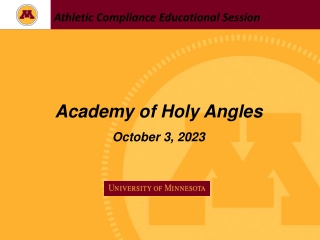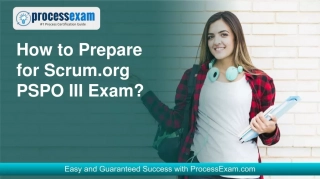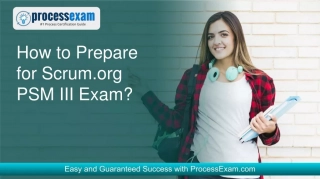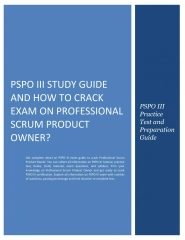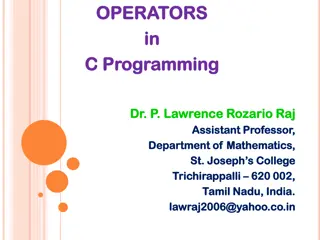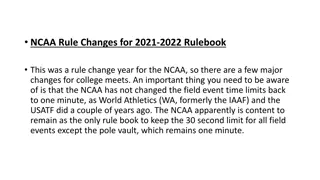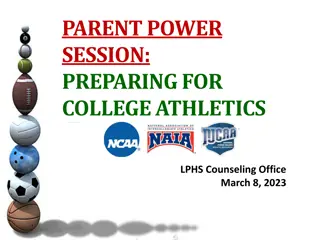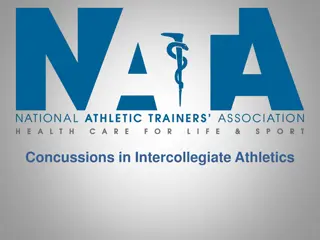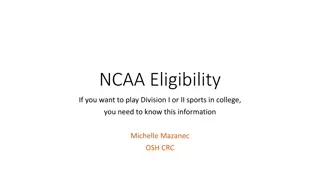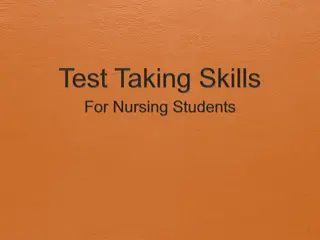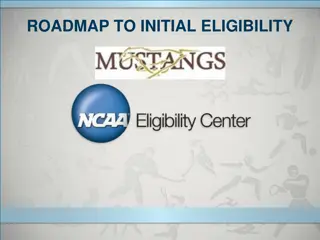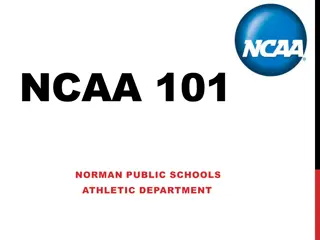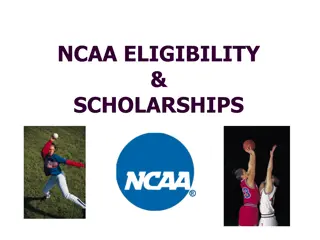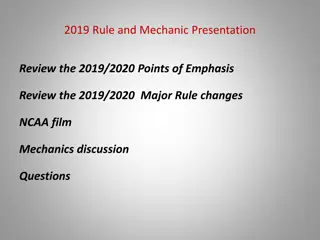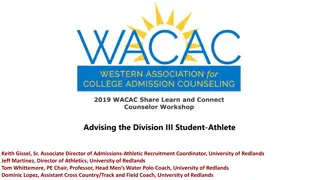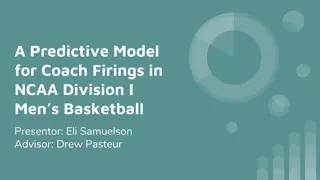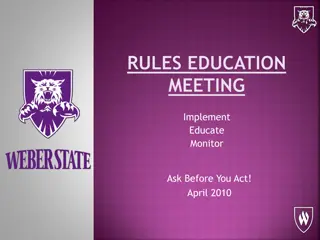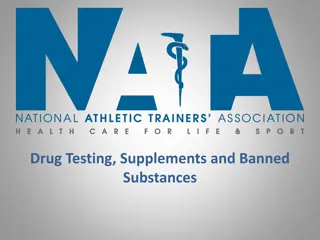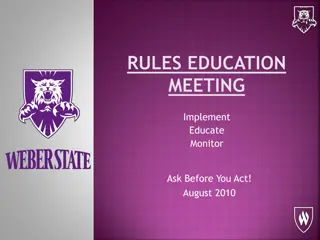NCAA Division III Rules Test 2021-22 Questions and Answers
This NCAA Division III Rules Test for 2021-22 consists of multiple-choice questions related to rules and regulations in collegiate sports. It covers scenarios involving coaches, student-athletes, scholarships, fundraising activities, and eligibility. Test your knowledge on NCAA Division III guidelines with these questions and possible answers.
Download Presentation

Please find below an Image/Link to download the presentation.
The content on the website is provided AS IS for your information and personal use only. It may not be sold, licensed, or shared on other websites without obtaining consent from the author. Download presentation by click this link. If you encounter any issues during the download, it is possible that the publisher has removed the file from their server.
E N D
Presentation Transcript
NCAA Division III Rules Test 2021-22
Question No. 1 As part of a private lesson, a coach may review a video of a prospective student- athlete and provide an evaluation to the PSA, provided the coach did not direct the PSA to complete the activities reflected in the video.
Question No. 1 - Possible Answers a. True. b. False.
Question No. 2 Mitch wants to continue as the high school baseball coach while also coaching at State University College. Which sport(s) are they permitted to coach at State University College?
Question No. 2 - Possible Answers a. Soccer. b. Baseball. c. Both A & B. d. None of the above.
Question No. 3 When may a local community group provide a prospective student-athlete with an athletics scholarship to run track at their secondary institution?
Question No. 3 - Possible Answers a. When the funds for the scholarship are disbursed through the secondary institution. b. When the funds for the scholarship are given directly to the prospective student-athlete. c. Either A or B. d. Prospective student-athletes may not receive athletics scholarships to participate at their secondary institutions.
Question No. 4 Which of the following could be a permissible team fundraising activity for student-athletes after enrolling at your institution?
Question No. 4 - Possible Answers a. Securing personal sponsorships from a professional team. b. Participating in activities that involve use of athletics ability in season (e.g., swim-a- thons, free-throw shooting, 5-k runs). c. Soliciting funds on behalf of a specific student-athlete. d. All of the above.
Question No. 5 A swimming student-athlete competes in a basketball tournament, wins and accepts a cash prize. What does this mean for the student-athletes eligibility?
Question No. 5 - Possible Answers a. The student-athlete is no longer eligible in any sport. b. The student-athlete is no longer eligible in swimming. c. The student-athlete is no longer eligible in basketball. d. Accepting a cash prize does not affect a student-athlete s eligibility.
Question No. 6 A professional sports organization may serve as a financial sponsor of an intercollegiate competition event, provided the organization is not publicly identified as such.
Question No. 6 - Possible Answers a. True. b. False.
Question No. 7 An enrolled student-athlete may attend an off-campus high school athletics event to speak to prospective student-athletes on their coach's behalf.
Question No. 7 - Possible Answers a. True. b. False.
Question No. 8 Prior to a PSA s financial deposit to the institution and May 1 of their senior year, a coach may use the following actions to react to social media content posted by the PSA:
Question No. 8 - Possible Answers a. Thumbs up for a like . b. Heart for love or favorite . c. Comment function. d. A & B.
Question No. 9 As long as a coach and PSA follow each other on a social media platform, there are no time restrictions as to when the coach may comment on the PSA s post, status or photo.
Question No. 9 - Possible Answers a. True. b. False.
Question No. 10 The electronic transmissions legislation, including the rules surrounding social media, apply to the following accounts:
Question No. 10 - Possible Answers a. Team accounts. b. Coach personal accounts. c. Student-athlete accounts, when directed by the coach. d. All of the above.
Question No. 11 Jamie is a prospective student-athlete who has just finished their official visit to Aim High University. Upon returning home, Jamie posts a picture from the visit on Instagram to announce their commitment to Aim High. What interactions can Aim High s team account have with Jamie s post?
Question No. 11 - Possible Answers a. Repost the picture (without comment) on the team account as soon as Jamie posts it. b. Comment on the picture before Jamie submits their financial deposit. c. Comment on the picture if it is after Jamie submits their financial deposit and after May 1 of their senior year. d. Both A & C.
Question No. 12 If a four-year student-athlete is interested in transferring to your institution, permission to contact is required in all situations except:
Question No. 12 - Possible Answers a. When the student-athlete is officially withdrawn from their previous institution. b. When a student-athlete has received a hardship waiver. c. When the student-athlete is transferring from a DIII institution and issues a self-release. d. Both A & C.
Question No. 13 While out on the road recruiting, Coach Shea decides to stop at a prospective student-athlete s high school. Before they can talk to the PSA directly, Coach Shea must receive permission from the high school s principal or other executive officer.
Question No. 13 - Possible Answers a. True. b. False.
Question No. 14 Under what conditions may an institution have contact with a prospective student- athlete before the student competes?
Question No. 14 - Possible Answers a. The competition cannot take place on the institution`s campus. b. The contact must occur on campus. c. Both A and B. d. None of the above.
Question No. 15 A prospective student-athlete may not be provided an official visit earlier than:
Question No. 15 - Possible Answers a. The opening day of classes of the prospective student-athlete's senior year in high school. b. The opening day of classes of the prospective student-athlete's junior year in high school. c. January 1 of the prospective student-athlete's junior year in high school. d. None of the above.
Question No. 16 An institution may provide meals during an official visit to whom?
Question No. 16 - Possible Answers a. Prospective student-athlete's parents or guardians. b. Spouse or individual of a comparable relationship to a spouse. c. Any individual accompanying the prospective student-athlete. d. None of the above. An institution may only provide meals during an official visit to the prospective student-athlete.
Question No. 17 Lee s parents and sister are tagging along on an unofficial visit to Aim High University. Aim High is permitted to admit Danielle to an at-home swim meet for free, but Danielle's family must pay to attend the meet.
Question No. 17 - Possible Answers a. True. b. False.
Question No. 18 It is permissible for an institutional coach to submit a congratulatory video to be played at a recruit s virtual high school signing ceremony.
Question No. 18 - Possible Answers a. True. b. False.
Question No. 19 In addition to the Division III Celebratory Signing Form, a prospective student-athlete who has committed to your institution may be sent a personalized cover letter that offers them a roster spot, provided.
Question No. 19 - Possible Answers a. The letter is produced by the institution. b. The letter does not require or request the PSA to indicate any form of commitment to attend your institution. c. The PSA is not asked or required to sign the letter. d. All of the above.
Question No. 20 A prospective student-athlete may take photographs on an official or unofficial visit and post the photographs on social media, provided an institutional staff member does not direct either action. With that in mind, which of the following may occur during a visit?
Question No. 20 - Possible Answers a. A prospective student-athlete may take a photograph with a coach or student-athlete and post it to social media. b. A prospective student-athlete who is on the sideline or the field/court before or after a contest may take a photograph of him or herself and post it on social media. c. A prospective student-athlete may take a photograph while dressed in or with a non- personalized item (e.g., locker, sign, institutional uniform or helmet, etc.) and post it on social media. d. All of the above may occur during a visit.
Question No. 21 Coach Anyssa is looking to start planning for next summer s institutional camp and knows that the event must be open to the general public in order to be permissible. Limiting the camp registration by which of the following is not considered to be open to the general public ?
Question No. 21 - Possible Answers a. Age. b. Grade point average. Bylaw 13.11.3.2. c. Grade level. d. Number of participants.
Question No. 22 A college coach who also coaches a club team made up of prospective student- athletes may post pictures on social media, provided the pictures are posted to the club team account and there is a clear distinction between the coach representing the club team versus representing the college.
Question No. 22 - Possible Answers a. True. b. False.
Question No. 23 Intercollegiate competition occurs when a two-year or four-year student-athlete:
Question No. 23 - Possible Answers a. Participates on a club-level team at an institution that also sponsors that sport at a varsity level. b. Rides on the bus with the institution's team, competes as an individual, but does not compete in the institution's uniform. c. Represents the institution in a scrimmage against another institution. d. All of the above.
Question No. 24 A student-athlete needs six credit hours and an experiential learning requirement to complete their degree. The student-athlete may take the six hours during the fall, complete the learning requirement the following spring and maintain eligibility to practice and compete in both terms, provided:
Question No. 24 - Possible Answers a. The experiential learning requirement is student teaching. b. The student-athlete will graduate early from the institution. c. The experiential learning requirement is considered full-time by the institution. d. The institution submits a legislative relief waiver.


